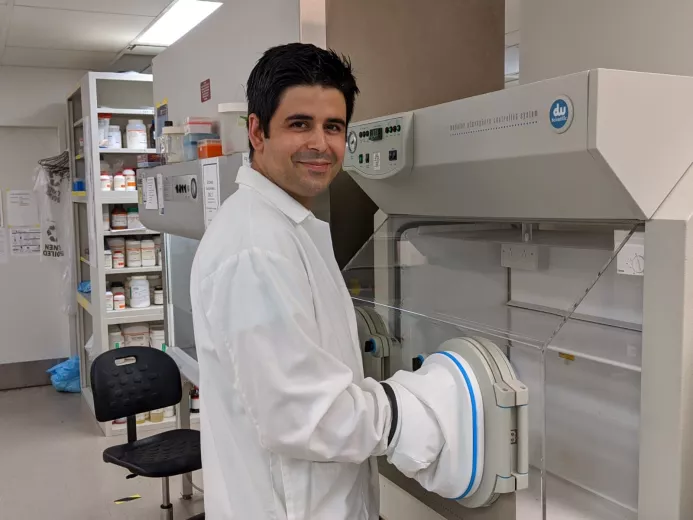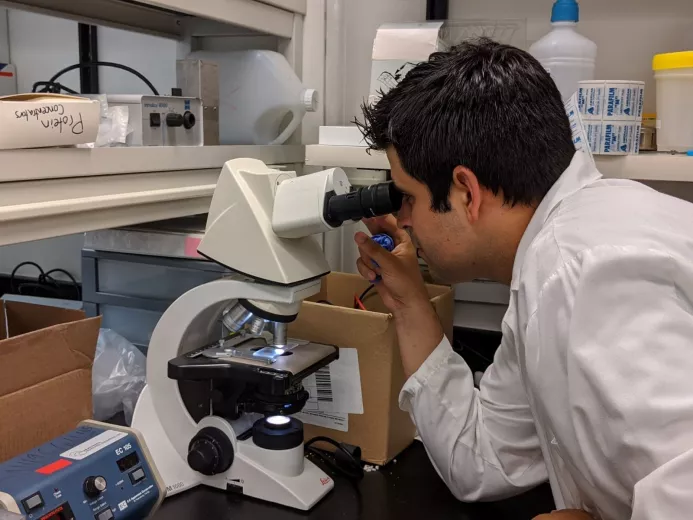
Project description
Intestinal microbiota interacts with dietary substrates that, in most cases, will benefit the host. Specifically, microbial metabolism of tryptophan, an essential amino acid contained in protein-based foods, releases indoles that activate the Aryl Hydrocarbon Receptor (AhR) in the gut, regulating immune and mucosal barrier homeostasis. There is growing evidence that altered diet-microbiota interactions contribute to chronic conditions such as inflammatory bowel disease (IBD). Recently, impaired tryptophan metabolism and downregulation of the AhR pathway was reported in IBD and linked to alterations in the intestinal microbiota. Current management of IBD is based on immune-modulatory therapy that is expensive and associated with adverse events. Despite high patient interest in dietary interventions to support pharmacological therapy in IBD, current recommendations are confusing or contradictory. Here, we studied the role of tryptophan metabolism by microbiota of healthy volunteers and IBD patients, and their capacity to activate homeostatic AhR-mediated pathways. Our results support that depletion of beneficial bacteria in IBD leads to impaired activation of the AhR pathway. We also isolated and identified several bacteria with capacity to activate AhR on a homeostatic manner. Mice colonized with human fecal samples reproduce the AhR activation phenotype of their human donors, supporting a major role of microbiota in tryptophan metabolism.Enriched tryptophan diet efficiently increased AhR activation but protection in clinical models require complex tryptophan-microbe interactions. It raises the hypothesis that effective intervention to prevent or treat colitis should understand these interactions, and target the availability of the tryptophan substrate as well as the beneficial bacterial metabolizers capable of homeostatic activation of AhR.
I am really very grateful to Biocodex Microbiota Foundation for giving me this opportunity. There is not much funding available for young researchers transiting to independent academic positions. This grant was a great opportunity for me and made a big impact on my scientific career. I got the award in my last year as a post-doctoral fellow at McMaster University, and this grant allowed me to initiate an independent research program from my supervisor. The award also helped to me set up new methodologies, establish national and international collaborations and gather preliminary results as a foundation for my independent career. The funding also was used for the training of an excellent graduate student (Liam Rondeau). I have an independent position as Assistant Professor at McMaster nowadays studying diet-microbiota interactions in chronic disease and food sensitivities. The topic is aligned with the main discoveries in the proposal.
I want to thank personally Biocodex Microbiota Foundation for giving me the first opportunity as independent researcher. I hope the Foundation keeps supporting young investigators like me for many years. It has a big impact in the scientific career of new rising star investigators.
8 years after...News from Dr. Caminero Fernandez
Introduce yourself, your research project and your experience with the Microbiota Grant
My name is Alberto Caminero and I am an Assistant Professor at the Division of Gastroenterology, Department of Medicine in McMaster University, and a full Member of the Farncombe Family Digestive Health Institute. I am a basic researcher with interest on the role of the intestinal microbiota in health and disease. My research program focuses on diet-microbiota interactions with relevance to food sensitivities and inflammatory bowel disease (IBD).
I was awarded with the Canada Biocodex Microbiota Foundation Grant in 2017. Here, I studied the implications of dietary tryptophan in intestinal inflammation. Tryptophan is an essential amino acid contained in protein-based foods with many bioactive properties. Dietary tryptophan can be digested by our intestinal microbiota releasing small rings (indoles) that activate an important homeostatic receptor in our gut, the Aryl hydrocarbon receptor (AhR). The AhR is very important in anti-inflammatory responses, xenobiotic clearance and protection to infections. It was previously described that patients with inflammatory bowel disease present an altered microbiota with defective capacity to digest tryptophan and downregulation in the AhR. The main goal of my proposal was characterizing beneficial bacteria depleted in IBD with the capacity to metabolize tryptophan, and design dietary interventions for the treatment of IBD. We found that well-defined enriched tryptophan diets in combination with the supplementation of beneficial bacteria releasing indoles, rescue inflammation in different mouse models of disease.
What inspired you to pursue this specific research project?
I have been always interested in diet-microbiota interactions of relevance in intestinal inflammation and adverse reactions to foods. Gut microbiota is a complementary metabolic organ that interacts with diet to produce a variety of active metabolites. Many of these metabolites are important in health and disease. During my training as a Postdoctoral Fellow at McMaster, I focused on the role of the intestinal microbiota in celiac disease, a gluten-driven enteropathy affecting the small intestine. Here, I collaborated in a project focused on microbial tryptophan metabolism in celiac disease. We found that these patients present an altered tryptophan metabolism and we designed different therapeutic interventions to restore gluten-mediated immune responses in preclinical mouse models. With this expertise and the acquired methodological approaches, I decided to explore this venue of research in inflammatory bowel disease from a microbiology perspective.
How has the Biocodex Microbiota Foundation Grant support contributed to the success and advancement of your research?
The Biocodex Canada Microbiota Foundation Grant was key in my transition to a faculty position and the establishment of my group at McMaster University. The Biocodex National Grant was the first grant I secured as an independent early career investigator. The award helped to me set up new methodologies, establish national and international collaborations, hire my first students and gather preliminary results as a foundation for my independent career. I was awarded with a CIHR Project grant on 2021 thanks to the preliminary data generated with my Biocodex Grant. This new 5-year grant has provided stability to my new lab and is a continuation of the main observations on my Biocodex grant. I am very grateful to Biocodex for giving me this opportunity and for supporting early career researchers in a delicate moment of their careers.
In what ways do you envision your work influencing the microbiota-related research in the future?
My research program focuses on diet-microbiota interactions with relevance to food sensitivities and inflammatory bowel disease. Our overall hypothesis is that gut microbes interact with specific dietary components releasing active metabolites that are beneficial or deleterious for the host. We have elucidated different mechanistic pathways by which intestinal microbiota influence disease and we have exciting data showing beneficial dietary interventions for the treatment of IBD in preclinical models. This includes microbial tryptophan metabolism and other pathways. For example, we have shown that bacteria can digest dietary allergens reducing well characterized adverse reactions to foods. We hope our research can define main microbial triggers and pathways involved in disease, and guide dietary advice in clinical practice in the future.
Canada's winning projects


Stress-Microbiota-Stem Cell Axis Disruption in Intestinal Epithelial Dysfunction and Therapeutic Restoration


Painful autoantibody cross-reactivity with the gut microbiome in fibromyalgia


PEARL-UTI: Probing the Essential and Adaptive Role of gut, vaginal microbiomes, urobiomes and mucus-like niches in the development of urinary tract infections in early adulthood women: a translational investigation


Evolution of the intestinal microbiome, inflammatory markers, and body composition across lactation stages in infants born to women with normal weight and overweight/obesity


Does immunosuppression contribute to metabolic syndrome via the intestinale microbiome?


Influence of hyperglycemia on the host-microbiome interactions during subgingival microbiome dysbiosis


Role of mucin-type O-glycans in regulating commensal vs. pathologic functions of Prevotella species in IBD


Determine the effect of pre-CD microbiota on physiological responses in the T-cell transfer model of colitis





